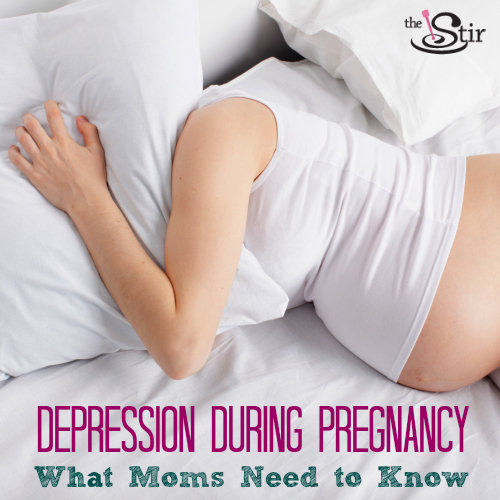Many women are under the impression that pregnancy is supposed to be a time filled with nothing but pickles, ice cream, and sheer elation. After all, you're growing one of the most important people you'll ever meet inside of you: What's there to frown about? But the fact is, between 14 to 23 percent of women will experience some signs of depression during their pregnancy. Often, these symptoms are overlooked, being chalked up to ever-changing hormones and the cliche image of a heavily pregnant woman freaking out on her husband for forgetting to bring home whatever food it was she was craving.
But depression isn't something that should be taken lightly during pregnancy. If left untreated, it will only get worse and could turn into postpartum depression.
There is hope if you're feeling blue, though. Here's everything you need to know about identifying depression and what to do about it:

Who's At Risk: Prenatal depression doesn't discriminate. If you have a close family member with depression or have a history of depression yourself, you may be more susceptible to prenatal depression, but anyone is still at risk. "Psychosocial stressors, such as trouble with the baby's father, unplanned pregnancies, and work issues, can all trigger depression in pregnancy," explains Judy Greene, M.D., who specializes in postpartum depression and perinatal mood disorders at Bellevue Hospital in New York.
The Signs: While it's normal to feel more emotional and easily-irritated than usual when pregnant, there are specific red flags to look for when it comes to prenatal depression.
"Depression in pregnancy is defined the same way 'regular' depression is defined," says Dr. Greene. "The only difference is it's occurring during pregnancy." If you think you may be depressed, you should talk to your doctor, but Dr. Greene advises women to evaluate whether five or more of the following symptoms have lasted longer than two weeks:
- Feeling depressed
- Not being able to enjoy things
- Disruptive sleep
- Having low energy
- Appetite changes
- Feeling bad about yourself
- Having trouble concentrating
- Moving slowly
- Feeling restless
- Having passing or persistent suicidal thoughts.
What to Do: The two primary ways of treating depression during pregnancy are talk therapy and, in more serious cases, taking an SSRI antidepressant, such as Prozac, Zoloft, or Lexapro. Psychotherapy, accompanied by things like exercise, light therapy, avoiding alcohol, and getting enough sleep, is almost always the first course of action in mild to moderate cases of pregnancy depression.
More From The Stir: Taking Anti-Depressants While Pregnant: Is It Safe?
But in more severe cases, medication may be necessary. The important thing is talking to your doctor right away. The longer you leave depression untreated, the more severe it can get.
"If depression during pregnancy goes untreated, it will continue on to postpartum," notes Dr. Greene.
Have you ever been depressed?
Images © 68/Ocean/Corbis; ©iStock.com/TatyanaGl




